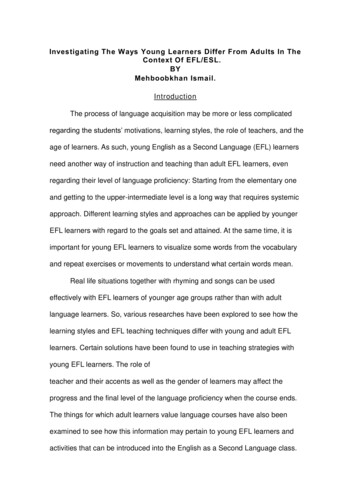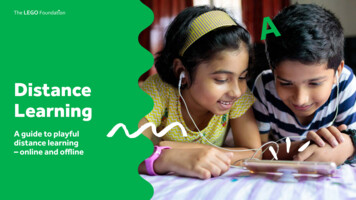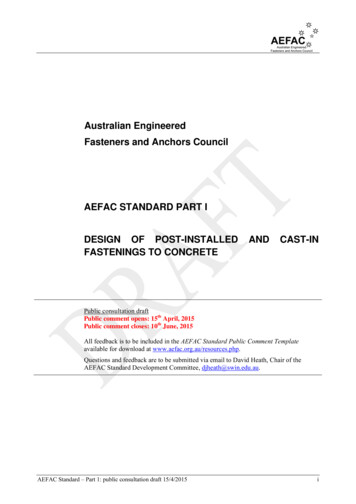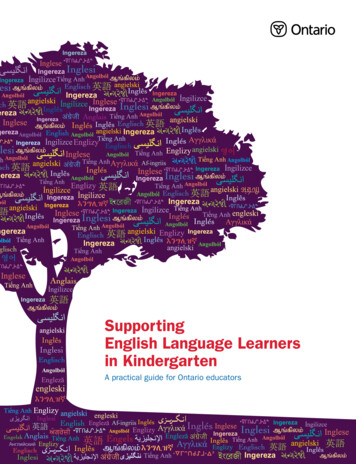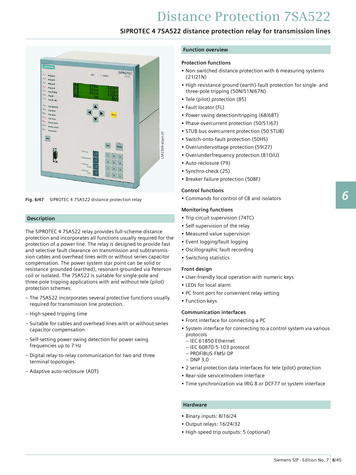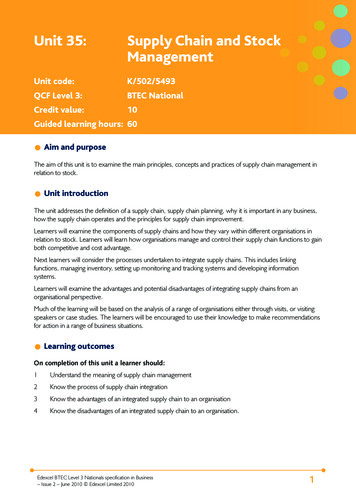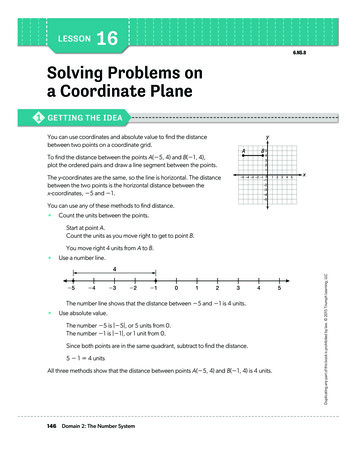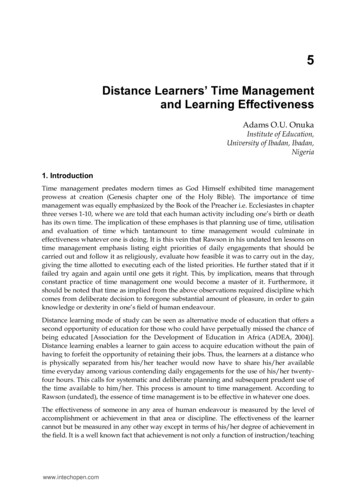
Transcription
5Distance Learners’ Time Managementand Learning EffectivenessAdams O.U. OnukaInstitute of Education,University of Ibadan, Ibadan,Nigeria1. IntroductionTime management predates modern times as God Himself exhibited time managementprowess at creation (Genesis chapter one of the Holy Bible). The importance of timemanagement was equally emphasized by the Book of the Preacher i.e. Ecclesiastes in chapterthree verses 1-10, where we are told that each human activity including one’s birth or deathhas its own time. The implication of these emphases is that planning use of time, utilisationand evaluation of time which tantamount to time management would culminate ineffectiveness whatever one is doing. It is this vein that Rawson in his undated ten lessons ontime management emphasis listing eight priorities of daily engagements that should becarried out and follow it as religiously, evaluate how feasible it was to carry out in the day,giving the time allotted to executing each of the listed priorities. He further stated that if itfailed try again and again until one gets it right. This, by implication, means that throughconstant practice of time management one would become a master of it. Furthermore, itshould be noted that time as implied from the above observations required discipline whichcomes from deliberate decision to foregone substantial amount of pleasure, in order to gainknowledge or dexterity in one’s field of human endeavour.Distance learning mode of study can be seen as alternative mode of education that offers asecond opportunity of education for those who could have perpetually missed the chance ofbeing educated [Association for the Development of Education in Africa (ADEA, 2004)].Distance learning enables a learner to gain access to acquire education without the pain ofhaving to forfeit the opportunity of retaining their jobs. Thus, the learners at a distance whois physically separated from his/her teacher would now have to share his/her availabletime everyday among various contending daily engagements for the use of his/her twentyfour hours. This calls for systematic and deliberate planning and subsequent prudent use ofthe time available to him/her. This process is amount to time management. According toRawson (undated), the essence of time management is to be effective in whatever one does.The effectiveness of someone in any area of human endeavour is measured by the level ofaccomplishment or achievement in that area or discipline. The effectiveness of the learnercannot but be measured in any other way except in terms of his/her degree of achievement inthe field. It is a well known fact that achievement is not only a function of instruction/teachingwww.intechopen.com
78Time Managementbut also a function of a number of several other factors including but not limited to timemanagement, home and school environments, school management among other factors(Durowoju 2010; Durowoju, Onuka and Onabamiro, 2010). Therefore, this study determinedhow time management affected the study/learning effectiveness of the distance learner andhow she/he can be assisted to effectively manage his/her twenty-four hours in order toeffectively study without being disadvantaged and earn degrees that they can truly claim tohave earned. In other words, in the study, the relationship between time management and thedistance learner study effectiveness [DLSE] was determined as well as the ways in which thelearners’ time management skills can be improved.Arising from the foregoing, the paper addressed the following two questions:1.2.What is the relationship between the distance learners’ time management and theirlearning effectiveness?How could their time management skills can be improved for learning effectiveness?2. Methodology2.1 Research procedureThis investigation, which is a pilot study on distance learners’ time management, was carriedout ex-post facto. This procedure was used because according to Kerlinger and Lee (2000), expost facto is the best approach to gathering data whose events had occurred as in this study.2.2 PopulationThe population was made of distance learners in the learning programmes of three FederalUniversities in South-West, Nigeria namely: University of Lagos, Akoka, Lagos, Universityof Ibadan, Ibadan and the Obafemi Awolowo University, Ile-Ife.2.3 Sampling procedure and sampleThe sampling procedure for selecting the participants for this study was purposivesampling technique. This is because randomization was not possible as the learners come tothe sites of the programmes only to collect text and other learning materials and for contactsessions, hence, subjects were purposively chosen from among distance learners in theFaculties of Education of these universities, as education has the largest participants indistance learning programmes of universities in Nigeria. Therefore, 40, 30 and 30participants were respectively selected from Ibadan, Lagos and Ile-Ife. The participants inthe study were those who have had at least three contact sessions and written examinationsthree times at three different levels.2.4 InstrumentationA nine-item time management checklist (Pro-forma) developed and validated by theresearcher using the content validity index computation formula given by Content ValidityIndex as espoused by Amin (2005) as Content Validity Index (CVI) the total numberjudges minus the number of judges declaring an item valid over total number of judges [nnj/n, where is total of judges, nj is number of judges declaring an item valid], which yieldedwww.intechopen.com
79Distance Learners’ Time Management and Learning Effectivenessan aggregate validity coefficient of 0.821 [the aggregate CVIs of the nine items]. This indexwas obtained by giving ten colleagues to ascertain the content validity of the timemanagement model or checklist. The instrument was again to another set of 10 experts toascertain the content validity; the outcome was then subjected to computation of the morecomplex Content Validity Ratio (CVR) formula (Lawshe, 1975) as related in Cohen andSwerdik (1999). This yielded an aggregate content validity ratio of 0.782. The formula is givenas Content Validity Ratio [CVR] number of experts indicating an item as essential minustotal number of judges divided by two over total number of judges divided by two, i.e.ne-n/2n/2,where n is the total number of experts, ne is number of experts regarding the item asessential]. This instrument was divided into nine broad daily and learning-related tasks, inwhich the learners may have to engage on daily basis, and to which they are to allocate timeout of twenty-four hours of the day. The instrument was a product of the aggregation of thetypical daily activities as indicated by 90 pre-research sampled distance learners from a nonparticipating university distance learning programme, who were requested to write downtwelve things they normally do each day of the week. It was from the collation of theinformation given by them that the model/instrument model shown below was designed bythis researcher. The items included in the instrument were those activities that wereindicated by at least 70% of the 90 learners [at least 63 distance learners]. The instrumentwas further administer on a similar sample outside of the participants in the study twice at aweek interval and its reliability determined using Pearson’s Product Moment correlationthrough Statistical Package for the Social Sciences [SPSS]. This process yielded a reliabilitycoefficient of 0.92.The specimen of the instrument is as shown in the table A below:S/No ofTaskTask12SleepGeneral preparationfor the dayInteraction with ICTin relation to learningSocial activitiesHome activitiesLearning activitiesWork activitiesLeisureOthers3456789Time Allotmentin hours for allthe participantsAverage TimeAllotment inhoursTime used as% of 24hrsSource: Time Management Model/checklist was designed by this Researcher for purpose of this studywhich could be adopted or adapted for future studyTable A. Specimen of Time- Management Model.www.intechopen.com
80Time ManagementThere was also a Focus Group Discussion Schedule on improving the distance learner’s timemanagement for effective study/learning effectiveness based on the content of themodel/checklist.Study effectiveness was determined by collating the Cumulative General Point Averages ofthe subjects used in the study and applied in the computation of correlation of effectivenessin relation to time management.The subjects were grouped into 5 groups of eight persons each in the University of Ibadanand 5 groups of six persons each in University of Lagos and Obafemi Awolowo Universityrespectively as focus group discussion [FGDs]. Each group was asked to discuss how theycan manage their time with regard to their schedules vis-vis their study.2.5 Procedure for data collectionThe instrument was administered on the 100 hundred participants chosen for the study fromthe three distance learning programmes in three universities in the South-West, Nigeria asaforementioned. The one hundred distance learners/participants of three Nigerian universitydistance learning programmes (University of Ibadan [40], University of Lagos [30] and theObafemi Awolowo University, Ile-Ife [30]) were asked to analyse how they plan, organize andutilize their whole time taking cognizance of their whole day undertakings using theinstrument/model provided for the study by the researcher. This was after a series of threelectures each on effective time management to each of the three groups at different timesduring their contact sessions at the three universities, to enable them to understand and tograsp the import of time-management in effective self-motivated/directed learning and tohelp them carry out the analysis of how they were managing their time in relation to theirstudy habits with the benefit of hindsight, insight and with foresight, endeavour to improveon their study habit vis-à-vis their time schedule for study and other necessary dailyengagements. The instrument was administered on the sample from each of the threeprogrammes to enable them assess how they have been planning, budgeting, organizing andimplementing their all day time vis-à-vis their daily task including sleep and all preparationsfor the tasks. Daily time management schedule of each group was computed. The participantswere requested to rate their study effectiveness which were cross checked by scrutinizing andusing their past results to correlate their time-management assessment, the ratings inpercentage were aggregated and the mean in percentage for each group was again put againstthe daily mean (i.e. typical day) as depicted by the results through the instrument. Theinstrument was administered personally by the researcher during their (learners) contactsessions. The instrument doubles as the distance time management model.The learners were also grouped into five focus discussions (FGDs} for each of the three ODLprogrammes by constituting for Ibadan and five panels of six each respectively for each ofLagos and Ife, using the FGD schedule on improving the distance learner’s timemanagement for study effectiveness whose responses denominated in percentages tocollate/analyse how time can be effectively managed for study or learning effectiveness. Inthe focus group discussions the members of the panel freely discuss each item of the FGDschedule which recorded and later was transcribed and coded in percentages to come outwith a recommended time management model/checklist.www.intechopen.com
81Distance Learners’ Time Management and Learning Effectiveness2.6 Data analysisThe resulting data from the research exercise were analyzed using percentages while thePearson’s Product Moment correlation statistic was also used to determine the relationshipbetween time management and study effectiveness of the distance learner using the SPSS.The opinions of the participants in the Focus Group Discussions (FGDs), on how to improvelearners’ time management and the concomitant study effectiveness were analysed usingpercentages.3. Results and discussion3.1 ResultsFrom the below table, the average time the participants from the University of IbadanDistance Learning Centre daily spent on different major activities such as Sleep is a quarterof a day, work-related activities and learning related activities take a total of 1/6 of theirdaily activities. The rest of the day is shared among all other activities.S/No of TaskTask123456789SleepGeneral preparationfor the dayInteraction with ICTin relation to learningSocial activitiesHome activitiesLearning activitiesWork activitiesLeisureOthersTime Allotmentin hours for allthe participants24060Average TimeAllotment .0*8.01.00.54.1710.428.3433.334.172.08Time used as% of 24hrsTable 1a. Time management schedule of University of Ibadan Distance Learning Centre.The correlation between University of Ibadan Distance Learning Centre Learners’ timemanagement and their learning effectiveness is shown in table 1b below:VariablesNMeanSDRSigAverage time spent with ICT402.00.340.940.00Learning activities402.00.32Table 1b. Correlation between average time spent on learning-related activities among U.I.Distance Learners’ study effectiveness.This table shows that there is a very high positive relationship between University of IbadanDistance Learning Centre [UIDLC] participants’ time-management and their learningwww.intechopen.com
82Time Managementeffectiveness. The implication of this finding is the effective time-management by distancelearner in UIDLC results in learning effectiveness of the learners.S/No ofTaskTaskTime Allotmentin hours for all theparticipantsAverage TimeAllotment inhoursTime used as% of 24hrs1Sleep1806.025.02Preparation for theday602.08.343Interaction withICT in relation tolearning451.56.254Social activities301.04.175Home activities602.08.346Learning activities451.56.257Work 2.17Table 2a. Time Management Schedule of University of Lagos Distance Learning InstituteParticipants.From the above table, the average time the participants of University of Lagos DistanceLearning Institute daily spent on different major activities are [a quarter of a day] on sleep, ahalf an hour more than Ibadan participants spent on work-related activities and an hour lessthan the time those of Ibadan spent learning related activities.The correlation between time spent on ICT and learning activities is shown in the tablebelow:VariablesNMeanSDRSigAverage time spent with ICT301.00.260.760.00Learning activities303.00.81Table 2b. Correlation between average time spent on learning related activities by Learnersat University of Lagos Distance Learning Institute and their learning effectiveness.This table shows that though relationship between time management and studyeffectiveness at the University of Lagos Distance Learning Institute is quite high at 0.76, yetit falls below what obtained in Ibadan. This implies that time management by the learners atLagos still results in some high level learning effectiveness of participants.From the below table, the average time by the participants at Obafemi Awolowo UniversityCentre for Distance Learning Centre daily spent on different major activities are as follows:6hrs {25% of a day}], 8 hrs on work related activities, the same as in UI and the same amountof time on learning-related activities [4hrs in all] as in Ibadan.www.intechopen.com
83Distance Learners’ Time Management and Learning EffectivenessS/No ofTaskTask12SleepPreparation for thedayInteraction withICT in relation tolearningSocial activitiesHome activitiesLearning activitiesWork activitiesLeisureOthers3456789Time Allotmentin hours for all theparticipants21045Average TimeAllotment 3.08.00.50.54.1710.4212.533.332.082.08Time used as% of 24hrsTable 3a. Time Management Schedule by Learners at the Obafemi Awolowo UniversityCentre for Distance Learning.The correlation between time management and learning effectiveness of the learners isshown in table 3b below:VariablesNMeansdrSig0.850.00Average time spent with ICT301.50.43Learning activities301.50.42Table 3b. Correlation between time management and learning effectiveness OAU DistanceLearners.Table 3b shows that relationship between time management by OAU learners and theirstudy effectiveness is also very high correlation at r-value 0.85. This result shows veryhigh positive correlation between effective time management and study effectiveness at Ife.4. Discussion4.1 Time management and learning effectivenessThe results from this study show that the differences in time-management ability or level ofapplication of time-management are a function of location and the degree of businessattached to the location. Amount of time available seem to possess inverse relation withlevel of industrial and commercial activities associated with a particular location. Forinstance, in Lagos that is the busiest city in the West African sub-region, the participantswere only able to spare a total of three hours to learning and learning-related activitiesgiving only 3hrs of 24hrs [12.5%] of a whole day or typical day. Whereas in Ibadan, a lessbusy city and less traffic congested city more time was available to distance learner forundertaking learning daily: a total of four hours was devoted to the same quantum ofwww.intechopen.com
84Time Managementlearning activities giving 16.68% as opposed to the 12.5% of the day giving to learning byLagos participants. However, it proves almost true that the levels of business and industrialactivities as well as that of traffic congestion are less than those of Lagos, when it came tothe turn of Ile-Ife which is the least busy of the three cities, as its participants devoted almostthe same quantum of time to learning and learning-related activities as did Ibadan, thoughnot in the same degree between pure learning activities and learning-related activities onInformation and Communication Technologies. While Ibadan share its four hours on equalbasis between the two, Ife does its own in a disproportionate manner, due its ‘ruralness’possibly because of the fact that the Ibadan participants who are not as busy as Lagosparticipants had more access to the use of these technologies than Ife, but took advantagethat it was less busy than Lagos to access ICT facilities more and utilize them. Consequently,the study/learning effectiveness shown by the study revealed that the Ibadan participantshad the highest level of study effectiveness of 96%, followed by Ife participants who thoughallocated more time to real learning activities, but could as much keep abreast of globaldevelopment in their fields of study because of the quantum of time they gave ICT activities.Thus, they nonetheless came second in study effectiveness with 85%, with Lagosparticipants bringing up the rear both in terms time management effectiveness andstudy/learning effectiveness with 76% study effectiveness as perceived by its participants.The difference in the correlation between Ibadan participants and Ife participants could dueto the degree of programme organisation and perhaps the fact that Ibadan has more relevantfacilities than Ife, while the busy nature and high level of traffic congestion rip off any goodimpact available relevant facilities as the combined effect of the busy nature and trafficcongestion neutralize the impact of possible access to good facilities One can easily noticethat chunk of the learner’s time is spent at work, a thing they do not have control over as thecase is with sleep, both of which together have between them something in neighbourhoodof 58.33-62.5% of the total daily time spent on them.These findings confirm the findings of Ogunsanya and Agu (1990), Onuka, Onyene andJunaid (2008) and Onuka (2010) respectively that effective time management, whichinvolves estimating the time each task requires to be effectively undertaken, planning it,budgeting, organizing and implementing as well as evaluating in order to revise it forpossible on it, would normally result effectiveness in handling the activities or getting theexpected results; and that effective time management calls for sacrifice or what could betermed ‘opportunity cost’ with regard to some activities that must be forgone for timemanagement effectiveness and accomplishment of expected outcome. The findings are alsoin consonance with the finding of Junaid (2010) that effective management of a distancelearning programme among other factors can result in appropriate programme outcome. Byimplication, if Nigerian university distance learning outfits are to be kept afloat, they mustnecessarily inculcate the spirit of time management in their learners (clientele). Thecorrelations between time management and their study effectiveness show that the moreeffective the learners were able to manage their time, the more they were effective in theirstudy, which goes to support the fact that effective time management can engender effectivestudy habit (Onuka et al, 2008). The outcome also confirm the view and finding of Rawson[undated] and Mokuolu [2007] that prioritizing one’s daily activities assists the individualmanage his time manage very well in order to become effective in his activities orundertaking. The findings therefore, imply that effective time management is a product ofwww.intechopen.com
Distance Learners’ Time Management and Learning Effectiveness85effective prioritization of one’s daily undertakings, while effective management in turnproduces dexterity in the worker/learner, thereby leading to learning or work effectiveness.4.2 Improving the distance learners’ time management effectivenessOn how to improve the learners’ time-management skills, the participants in the groupsproffer that as part of orientation programme for participants of Nigerian universitydistance learning programmes, time management should be taught to the participants bothtextually and electronically. This, they opined would enable them to understand the need tomanage their time vis-à-vis their daily tasks including the schedule for the study, as suchwould motivate them to daily have some time out of their daily schedule. Thisdevelopment, according to them will assist to become effective distance learners, as theyconfess that quite often they have had no regular time table for daily engagement inlearning, unless when they receive notification on contact sessions and/or examinationschedule. They averred that lack of time-management skills had hindered hitherto fromeffective learning as they were not able to manage task time effectively and as such were lesseffective in their learning styles and the concomitant learning/study effectiveness. Therewere no differences in opinion about these results by the participants from the threeprogrammes. This is perhaps so, because in Nigeria, educational programmes by similarinstitutions are run in the same manner particularly the distance learning programmes(Junaid, 2010). The participants also felt that if they have had personal advisors assigned toguide each of them, they would have realized the enormity of the tasks ahead and thusevolve a time-management spirit which (Rawson, undated; Ogunsanya and Agu, 1990)stated was essential to effectiveness whatever area of human endeavours one is engaged.These views by the respondents also conform to the observation of (Onuka, 2010; White,1998; Mokuolu, 2007) that time-management skills are not in-born but are acquired througheither training or constant observation of the activities of a ‘trained’ or practicing timemanager, because as he said time is about the only resource that has been equitablydistributed among humans of all races, creed or climes. This also confirms Rawson’s[undated] implied view that effective time management requires high level of self-disciplinewhich, of course results from sacrifice of certain not very essential things that the economistwould refer to as opportunity for time management effectiveness. Thus, individual mustdecide to profitably use his or her time. This implies making sacrifice of activities that maybe essential but not expedient or necessary.The study, therefore, evolved the following model for distance learners’ time managementschedule for strict observance during their course of study in order to improve timemanagement prowess of the distance learner to engender his/her learning effectiveness.Synthesising the above, the study evolved a model time-management for the effectiveness ofthe learner in South-West, Nigeria and other parts of the country because the muchsimilarities in work hours and endeavours especially in respects of social engagements, andother habits. Nothing anyone can do about the working hours, hence the nine hours allottedfor work, medically, 6 hours would be sufficient for an adult and our population is an adultone. It is expected that as education is investment and investment is the sacrifice madetoday for tomorrow’s enjoyment or gain, hence the one hour so allotted to it. Thus, socialactivities must be minimized. Thus, the effective distance time management model is givenwww.intechopen.com
86Time Managementby S Gp Ct Sa Ha La Wa Lt Th or The linear equation for DLSE can be as afunction of effective time management given by [DLSE f (24 S –Gp –Sa –Ha –Lt –Wa –Th)],{Where S (sleep) [6]; Gp (General preparation) [1]; Ct (Interaction with ICT) [11/2]; Sa (Socialactivities) [1/2]; Ha (Home activities) [2]; La (Learning activities) [3]; Wa (Work placeactivities) [9]; Lt (Leisure time) [1/2]; Th (Others) [1/2]}. Alternatively the model canrepresented as follows: DLSE (i.e. Distance Learner Study Effectiveness) 24 –S –Gp –Sa –Ha –Lt –Wa –Th. The figures in parenthesis [] shows the recommended time for the activity afterwhich they appear. The recommended aggregate daily study time [including learningrelated activities] apart from total daily time allocated to non-learning activities in oursuggested is 11/2 3 41/2 giving 27 hours a week while providing one any day of the week isutilized for rest all through. However, the distance learner decides how s/he uses the rest ofSaturday when he might not be at workplace.TaskTime Allocated to TaskPercentage of 24 HoursSleep6 hours25%General preparation for theday1 hour4.2%1 hour 30 minutes6.2%Social activities30 minutes2.1%Home activities2 hours8.3%Interaction with ICT inrelation to learningLearning activities3 hours12.5%Work activities9 hours37.5%Leisure time30 minutes2.1%Others30 minutes2.1%l24 hours100%TotalTable 4. Recommended Daily Time- Management Model for Effective Distance Learning.5. Conclusion and recommendations5.1 ConclusionIt is obvious that Open/distance learning mode has become an acceptable means ofproviding access to higher education in this twenty-first century. In Nigeria, where therehave been constant shortfall between demanded spaces in higher education institutions andthe supply therefrom, and where public and private university-based distance learningprogrammes are self-sustaining, all such programmes must endeavour to ensure that itsoutputs are quality products comparable to what the formal university system outputs. Thebest way of so assuring this phenomenon is by inculcating the spirit of time management inits learners at the beginning of their enrolment into their various programmes, because thelearners are expected to do at least 75% of their study/learning by themselves on their ownby means of self-regulation, to enable them to do effective time-tabling to guide them intheir individual study efforts. Since it is invariably very clear that time-management skillsneed to be taught, as it can only be acquired through learning and by constant observationwww.intechopen.com
Distance Learners’ Time Management and Learning Effectiveness87of the practical time manager exhibiting his skills in the way he organizes and executes histasks promptly and profitably. With this done the programmes can then be assured of everexpanding clientele and perpetual self-sustenance. A recommended time-managementmodel has been evolved for the distance learner for effective learning from this study, whichhe/she can adjust to suit his/her own purpose-appropriate feasible time- schedule andexecution [management]. This obviously involves self-discipline resulting deliberatesacrifice of certain not too essential activities and putting off those that can be put on holdfor future time and deliberately using the saved time from such sacrificed activitiesprofitably in one’s field of human endeavour, which in this case is open/distance learning.5.2 RecommendationsTherefore, the following recommendations are hereby made for the consideration: That Nigerian university-based distance learning programmes should as a matter ofnecessity, organize annual time-management orientation course for their new entrantsand also on study habit;That consideration should be given to the nature of location in order to absorb anyexternalities resulting therefrom in the time management process for studyeffectiveness;That programme advisor/counsellor should be assigned to each distance learner for thepurpose of guidance particularly in terms of use of available time among seeminglycompeting needs, so that he can learn to effectively manage his time both effectivelyand efficiently, thereby engaging himself/herself in effective learning;That distance learners must learn to forgo some essential activities that may not benecessarily expedient, in which case, the learner must learn to prioritize their dailyactivities and forgo those found not expedient, to enable them devote substantial timeto their self-regulated learning activities including those that can be mostly acquiredusing ICT facilities;Learners should be disciplined by deliberately sa
1. What is the relationship between the distance learners time management and their learning effectiveness? 2. How could their time management skills can be improved for learning effectiveness? 2. Methodology 2.1 Research procedure This investigation, which is a pilot study on distance learners time management, was carried out ex-post facto.
